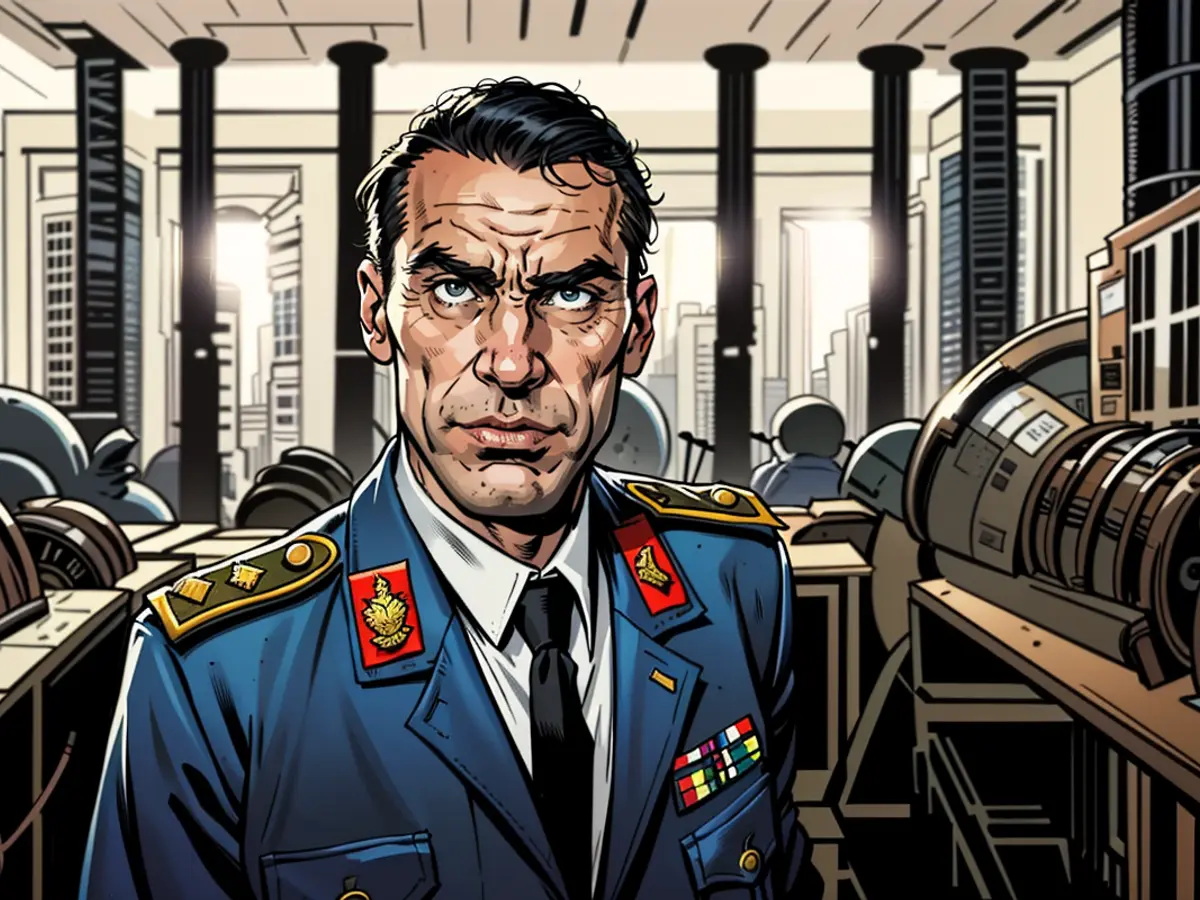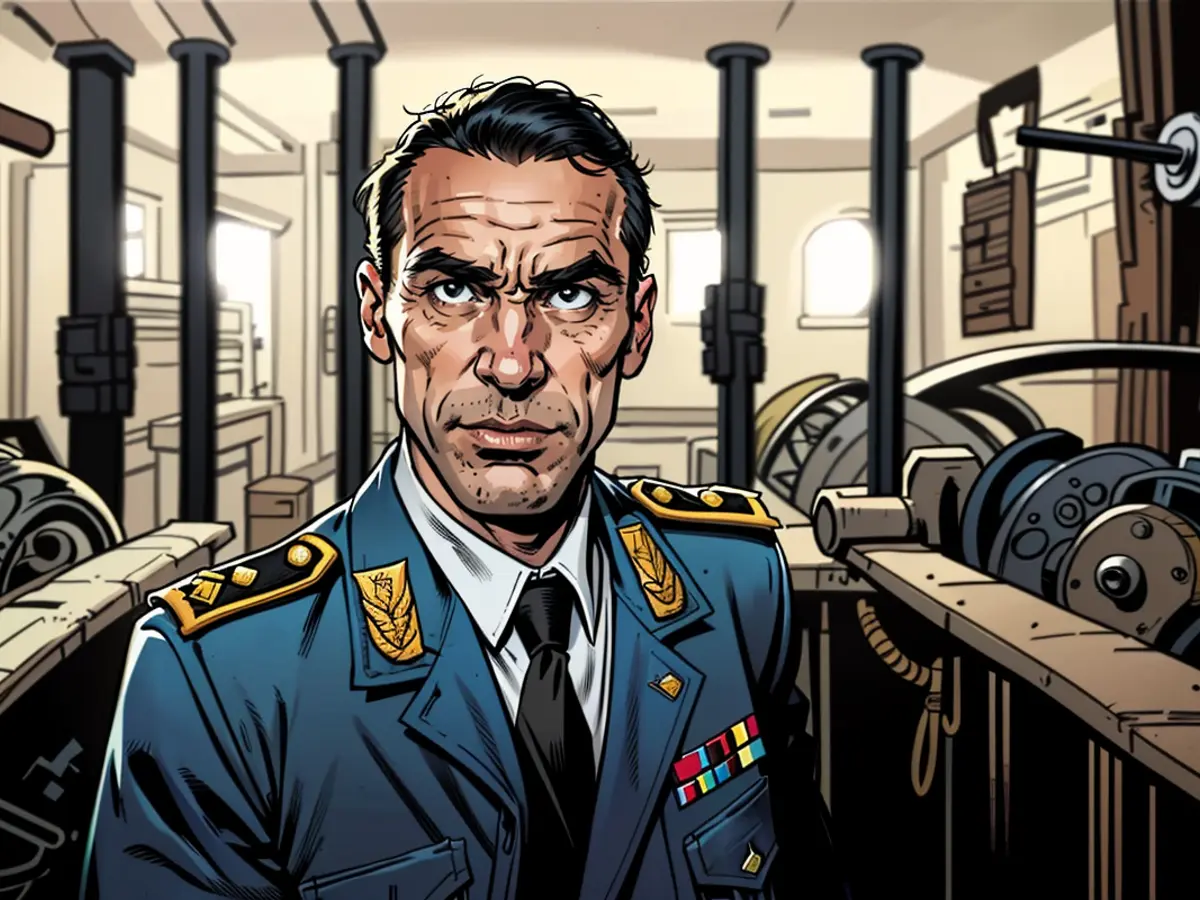At 14:03, there's potential indication that Russia was aware of the approach towards Kursk.
According to a report by The Guardian, quoting alleged Russian documents allegedly found by the Ukrainian military during its operation in Kursk, Russian authorities and the military may have had warnings of potential Ukrainian advances onto Russian territory as early as January 2024. The report notes that The Guardian could not independently verify the authenticity of the documents, but they appear to share typical characteristics of genuine Russian military communications. Measures to strengthen border defense reportedly began as early as mid-March, but concerns persisted into June that units were operating with only 60-70% of their full strength and were primarily made up of poorly trained reservists. Ukrainian forces launched a surprise attack on the Kursk region at the beginning of August.
13:30 BBC: More Than 70,000 Russian Soldiers Identified as Killed in Ukraine
A Russian news portal and the BBC claim to have identified over 70,000 Russian soldiers killed in Ukraine. The BBC's Russian service reports that it has identified the names of 70,112 Russian soldiers killed in Ukraine, but the actual number is likely much higher. This tally is based on the analysis of official statements, obituaries, online death notices, and observations of graves in Russian cemeteries, covering the period from the start of the war in February 2022 to September 19. Independent Russian news site Mediazona estimates that the total number of Russian soldiers killed in Ukraine is at least 120,000. The Russian government treats the number of Russian soldiers killed in the war as a state secret.
12:50 Ukraine Restricts Use of Telegram by Government, Military, and Security Personnel
Ukraine has largely banned the use of the online service Telegram for government, military, and security personnel. The National Security and Defense Council announced on Facebook that the installation and use of Telegram on official devices of government officials, military personnel, security and defense sector employees, and critical infrastructure operators is now prohibited. The ban is reportedly due to concerns about "national security."
12:23 Raiffeisen Bank Sells Belarus Subsidiary and Exits Market
Austrian bank Raiffeisen Bank International (RBI) has agreed to sell its Belarusian subsidiary and withdraw from the market. The bank announced that it has signed an agreement to sell its 87.74% stake to Soven 1 Holding Limited. The sale will significantly impact the bank's results. RBI has already significantly scaled back its operations in Russia due to pressure from the European Central Bank. However, a Russian court has issued an interim injunction preventing RBI from selling its subsidiary in Russia.
12:01 Report: EU Plans €35 Billion Loan for Ukraine
The European Commission is reportedly planning a €35 billion loan for Ukraine as part of the aid plans of the G7 leading industrial nations, according to the Financial Times, citing three sources familiar with the matter. The loan is part of the G7's intention to provide Ukraine with $50 billion (around €46 billion) through the use of profits from frozen Russian state assets.
EU Commission President Ursula von der Leyen has officially announced the financial aid of up to €35 billion.
11:33 Russia Warns West: Do Not Provide Ukraine with Long-Range Weapons
The Russian government has warned the West not to provide Ukraine with longer-range weapons threatening Russian territory. In such a scenario, the nature of the conflict would change, according to Foreign Ministry spokeswoman Maria Zakharova. "They are playing with fire," she said at a press conference. The conflict could become completely different, posing dangerous consequences for the world. Zakharova sees no prospects for negotiations with the US at present. No meeting between Foreign Minister Sergei Lavrov and his American counterpart Antony Blinken is expected on the sidelines of the UN General Assembly in New York, as "both sides have nothing to discuss." Previously, the outgoing NATO Secretary-General Jens Stoltenberg had emphasized that multiple red lines had been drawn by Russian President Vladimir Putin that he had not crossed. "He hasn't done it because he knows that NATO is the strongest military alliance in the world," Stoltenberg said.
10:53 EU: Forced Expulsion of Ukrainian Men "Not Possible"
The European Commission has clarified that male Ukrainian citizens of conscription age cannot be forcibly expelled from EU countries. This is not possible due to the Directive on temporary protection, according to EU Commissioner for Home Affairs Ylva Johansson. "We will support those who want to return to Ukraine, and we will discuss with Ukrainian authorities and the Ukrainian government how this can best be done. We will not expel anyone from the EU," she emphasized. Previously, Poland's Foreign Minister Radosław Sikorski had reportedly called on Western European countries to encourage Ukrainian men of conscription age to return to Ukraine. Ukrainian Foreign Minister Andrij Sybiha reportedly supported this idea.
10:12 General Freiding Sees "Loopholes" in Russia Sanctions
Military coordinator of German Ukraine aid, Christian Freiding, said that while sanctions are having an impact on Russia's weapons production, the country still manages to keep its defense industry running. Russia accomplishes this by taking detours and relying on support from partners like China, North Korea, and Iran. There are possibilities, Freiding noted, to "find loopholes or even completely legal circumvention options."
09:03 Von der Leyen Promises Additional Aid for Ukraine's Energy NeedsEU Commission President Ursula von der Leyen has promised additional assistance for Ukraine's energy needs during the upcoming winter while visiting Kyiv. "My eighth visit to Kyiv coincides with the approaching heating season, and Russia continues to attack energy infrastructure," she stated on social media platform X. She shared a picture of her arrival at Kyiv's train station. "We will support Ukraine in its courageous endeavors. I'm here to discuss Europe's aid, from winter preparations to defense, EU membership, and progress on G7 loans."
08:20 EU Ponders Restricting Visa-Free Travel for GeorgiansBrussels is pondering over imposing travel restrictions for Georgians visiting the European Union due to democratic deterioration under the rule of the Georgian Dream party, according to an unnamed EU official. "All possibilities are on the table" if Georgia fails to revert its shift towards authoritarianism, the official told Politico. This includes the potential suspension of visa liberalization, they added. Recently, the ruling Georgian Dream party passed a law mimicking repressive Russian legislation against Kremlin detractors.
07:42 Ukraine Slams Poland's Crimea SuggestionThe Ukrainian Foreign Ministry has criticized Poland's proposal regarding Crimea's status, insisting that compromises are not an option. Polish Foreign Minister Radosław Sikorski suggested holding a referendum on the peninsula as part of a possible negotiation solution with Russia. "All efforts should focus on liberating the peninsula, not on satiating the Kremlin's desires at the expense of Ukraine's interests and international law," the Kyiv Foreign Ministry explained.
06:29 Von der Leyen to Meet with Zelenskyy in KyivEU Commission President Ursula von der Leyen is expected to meet with Ukrainian President Volodymyr Zelenskyy today. In a statement, Zelenskyy announced discussions about winter preparations. "Naturally, energy is a primary concern," he stated. Other agenda items include the situation on the front lines, weapons supplies, joint defense projects, Ukraine's EU membership aspirations, and additional financial aid for the country targeted by Russia.
05:32 Ukraine Joins NATO Exercise for First TimeUkraine is participating in a NATO exercise led by the Netherlands for the first time. The ongoing exercise aims to test anti-drone systems, NATO reported. More than 60 anti-drone systems and technologies, including sensors, drone-to-drone systems, jammers, and cyber-hunters, are being tested, according to NATO. Ukraine's involvement is part of the NATO-Ukraine action plan for innovation cooperation, agreed at the July summit.
04:28 Transgender Activist M deaths in GeorgiaFamous transgender activist Kesaria Abramidze was stabbed to death in her apartment in Georgia, shortly after the adoption of an international LGBTQ law. Abramidze, a model, actress, and influencer, was killed with multiple stab wounds on Wednesday, as per the Georgian Ministry of Internal Affairs. Her boyfriend was arrested as the prime suspect, charged with murder with "extraordinary cruelty" due to the victim's gender.
03:25 Lufthansa Plans to Halt Frankfurt-Beijing FlightsLufthansa is reconsidering its daily service between Frankfurt and Beijing. A decision is expected in October. A Lufthansa spokesperson cited the "unfair competitive playing field" for European airlines versus Chinese and airlines from the Persian Gulf and Bosporus, which benefit from lower operating costs, minimal labor standards, and significant aviation funding from their governments. Additionlly, these airlines still have access to Russian airspace, which European and American airlines have been denied since the introduction of sanctions against Russia due to the Ukraine conflict, resulting in higher fuel costs.
02:27 Russian Forces Attack Energy Center in SumyRussian forces launched new air strikes on the Ukrainian city of Sumy on Tuesday evening, striking a geriatric center and targeting the energy sector. One civilian was reportedly killed by the attacks, according to Ukrainian officials. A UN monitoring body indicated that the attacks on the power grid may have violated international humanitarian law. The International Energy Agency reported in a study that Ukraine could face power supply gaps reaching up to a third of peak demand during the winter months.
01:25 Over 1.18 Million Ukrainian Refugees in GermanyThe number of refugees in Germany has reached a new record. Around 3.48 million refugees resided in Germany at the end of the first half of 2024, according to the Foreigners' Registration Office, an increase of approximately 60,000 compared to the end of 2023 and the highest number since the 1950s, according to the "New Osnabrücker Zeitung" (NOZ), citing data from the German government in response to a parliamentary question from the Left party in the Bundestag. Around 1.18 million of these refugees are from Ukraine, a 45,000 increase from the end of 2023. The figures include all refugees, regardless of their status, from asylum seekers to recognized refugees to tolerated individuals.
00:22 Lindner: Ukraine Aid Not Justification for Debt Brake Suspension SPD and Green political figures often bring up an agreement within the traffic light coalition to suspend the debt brake for extensive Ukraine aid as a point of contention in the budget dispute. However, FDP leader and Finance Minister Christian Lindner denies such an agreement: "I'm not aware of such an agreement. I wouldn't have agreed to such a resolution," Lindner stated to the "Rheinische Post." The war in Ukraine is a tragic situation, but not a state of emergency as per the Basic Law. "Consequently, we're working diligently on a 50-billion-dollar initiative from G7 nations, alongside our bilateral aid, for Ukraine," declares Lindner.
23:23 Bulgaria Advocates for EU Ban on Ukrainian Egg Exports Bulgaria plans to propose a ban on egg imports from Ukraine during the EU Agriculture and Fisheries Council meeting on September 23 in Brussels, as announced by Bulgarian Minister of Agriculture Georgi Takhov. This move is a continuation of conflicts between Ukraine and eastern EU member states regarding agricultural trade. These conflicts have led to border blockades on the Ukrainian-Polish border, import bans on Ukrainian corn and wheat, and farmer protests in Poland and Bulgaria.
22:13 Merz Perceives "No Chance for Peace Process" with Russia CDU leader Friedrich Merz expresses concerns about the situation in Ukraine and remarks: "I don't think there's a chance to initiate the peace process at the moment." Russia will only cease when further military action appears futile or when Kyiv collapses. In the long term, Germany must continue to provide military support to Ukraine. "I believe we must defend freedom and peace against Russia for the long term, not with Russia," Merz states. This is a somber realization. "There is no other option at the moment, at least as long as Putin and his regime remain in power."
The President of the Council of the European Union, Ursula von der Leyen, announced the financial aid of up to €35 billion for Ukraine.
In response to concerns about national security, Ukraine has prohibited the use of the online service Telegram for government, military, and security personnel.









